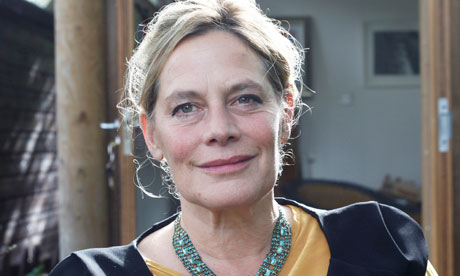David Constantine and Deborah Levy join shortlist alongside Joyce Carol Oates and Peter Stamm

Taking on the world ... Deborah Levy. Photograph: Sophia Evans
British authors David Constantine and Deborah Levy will face fierce competition on the shortlist for the Frank O'Connor short story award, it has been announced, with the multiple award-winning Joyce Carol Oates and Peter Stamm also in the running.
Worth €25,000, the Frank O'Connor is the world's richest award for a single short-story collection, and has been won by some of the biggest names in international literature, from Haruki Murakami to Nathan Englander and Edna O'Brien. This year judges chose a shortlist of six titles from 78 longlisted books, with writers including George Saunders, Junot Díaz, Molly Ringwald, Emma Donoghue and former winner Ron Rash all missing out.
Instead, the panel went for Oates's Black Dahlia & White Rose, which includes a story about a friendship between Marilyn Monroe and Elizabeth Short, and Swiss writer Stamm, a finalist for this year's Man Booker International prize, for We're Flying.
Oates's fellow American Claire Vaye Watkins was selected for Battleborn, set in her home state of Nevada, and Canadian Tamas Dobozy for Siege 13, a series of linked stories alternating between second world war Hungary and a community of Hungarian émigrés in the contemporary west.
Britain's contenders are Levy, shortlisted for the Booker last year and this time picked for her collection Black Vodka, which includes a story in which a hunchbacked man has a date with his perfect girl, and Constantine, chosen for Tea at the Midland, a collection which the Guardian called "masterful … pregnant with fluctuating interpretations and concealed motives".
Choosing the final six, said judge and Irish author John Deane, was "no less than an adventure".
"From an ebb-tide in the short-story form – particularly in Ireland and the UK over the last few decades – to this flood-tide proved a delight and a deep sense of optimism in me for the form," said Deane. "Overall, among the original 78, there were very few titles that could be dismissed quickly, hence the wealth and excitement of the presentation at our discussion. I have been enlightened, at times even mesmerised, at the variety, the strength, the depth and the numbers of experimental books."
As well as Deane, this year's judging panel also featured Cathy Galvin, former deputy editor of the Sunday Times and founder of the Sunday Times short story prize, and Brigid Hughes, former executive editor of the Paris Review and founder editor of A Public Space. "It was an honour to judge the prize and the prospect of re-reading such wonderful and diverse work as we decide on the winner is a pleasure," said Galvin.
The winner will be announced in the first week of July, with the award to be presented in September at the culmination of the Cork International short story festival.
Worth €25,000, the Frank O'Connor is the world's richest award for a single short-story collection, and has been won by some of the biggest names in international literature, from Haruki Murakami to Nathan Englander and Edna O'Brien. This year judges chose a shortlist of six titles from 78 longlisted books, with writers including George Saunders, Junot Díaz, Molly Ringwald, Emma Donoghue and former winner Ron Rash all missing out.
Instead, the panel went for Oates's Black Dahlia & White Rose, which includes a story about a friendship between Marilyn Monroe and Elizabeth Short, and Swiss writer Stamm, a finalist for this year's Man Booker International prize, for We're Flying.
Oates's fellow American Claire Vaye Watkins was selected for Battleborn, set in her home state of Nevada, and Canadian Tamas Dobozy for Siege 13, a series of linked stories alternating between second world war Hungary and a community of Hungarian émigrés in the contemporary west.
Britain's contenders are Levy, shortlisted for the Booker last year and this time picked for her collection Black Vodka, which includes a story in which a hunchbacked man has a date with his perfect girl, and Constantine, chosen for Tea at the Midland, a collection which the Guardian called "masterful … pregnant with fluctuating interpretations and concealed motives".
Choosing the final six, said judge and Irish author John Deane, was "no less than an adventure".
"From an ebb-tide in the short-story form – particularly in Ireland and the UK over the last few decades – to this flood-tide proved a delight and a deep sense of optimism in me for the form," said Deane. "Overall, among the original 78, there were very few titles that could be dismissed quickly, hence the wealth and excitement of the presentation at our discussion. I have been enlightened, at times even mesmerised, at the variety, the strength, the depth and the numbers of experimental books."
As well as Deane, this year's judging panel also featured Cathy Galvin, former deputy editor of the Sunday Times and founder of the Sunday Times short story prize, and Brigid Hughes, former executive editor of the Paris Review and founder editor of A Public Space. "It was an honour to judge the prize and the prospect of re-reading such wonderful and diverse work as we decide on the winner is a pleasure," said Galvin.
The winner will be announced in the first week of July, with the award to be presented in September at the culmination of the Cork International short story festival.
No comments:
Post a Comment